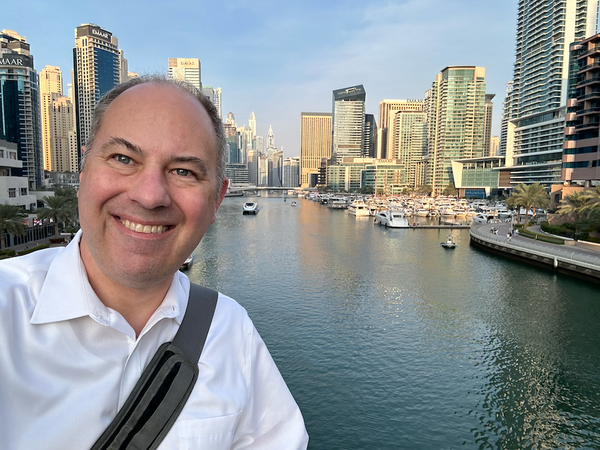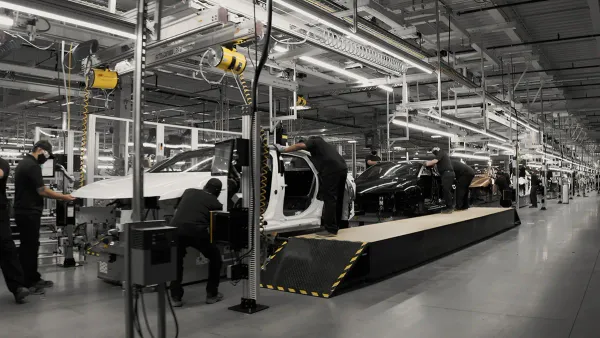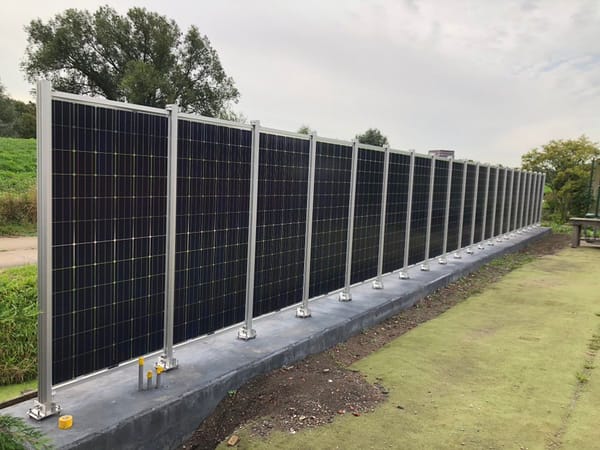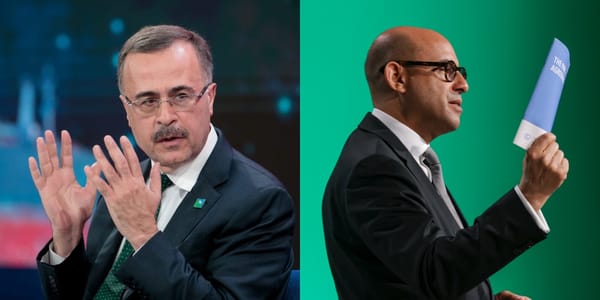Report from Dubai: It’s the Saudis' show now
Good evening from Dubai,
After a long day of waiting and numerous false alerts that something was coming, a draft text on climate mitigation was finally revealed at the end of the day in Dubai. The missing part: The words “phase out”.
Almost all of the text on climate mitigation (a fancy word for “stop making things worse”) from yesterday’s draft Global Stocktake statement was junked, replaced by new language that is neither connected to science nor sets specific benchmark dates for achievement. In addition, the new text is a “clean draft”, meaning it has no options to be discussed by delegations in tomorrow’s plenary session – the theoretical last day. It’s a take it or leave it set of options.
Also, there was only one other draft text released – on Section 6.4, the private sector carbon credits rules – but the many other texts, such as on finance, other carbon trading rules, and Global Goals on Adaptation, remained unreleased at this newsletter’s publication, at 9:00 p.m. Dubai time.
I’ll discuss the nature of the Global Stocktake draft text more below, but first a description of my day in Dubai.
-Mike
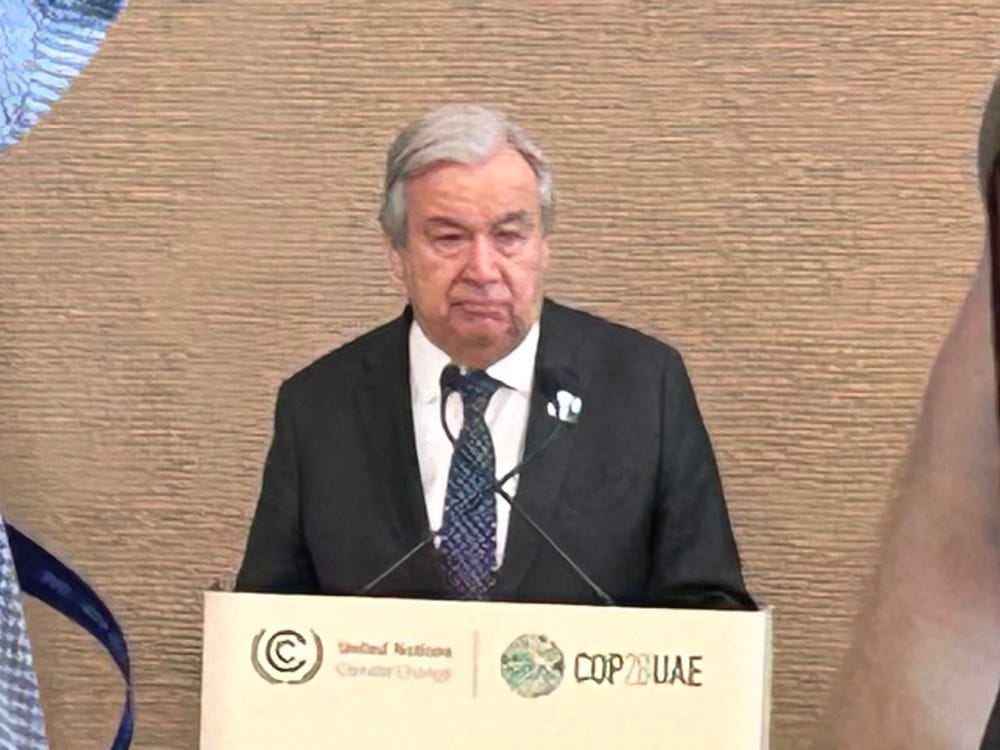
What Happened Today
Yesterday I reported that the Saudis were either blocking or causing slowdowns in discussions in multiple negotiation groups. Early this morning, the New York Times issued a well-sourced article that accuses the Saudi delegation of running a coordinated strategy to not only block language for a fossil fuel phase out in the Global Stocktake text, but also blocking movement in at least two other text discussion groups in an effort to gum up the works for all of COP. This move gave the Saudis maximum leverage for their key concern, the fossil fuel phase out.
Readers of this newsletter know I’ve been closely following carbon credit trading rule discussions. An observer from those meetings told me that last night the Saudi negotiator stirred the pot, starting a heated argument about the process with the U.S. negotiator.
Observers of other meetings agreed.
“We see that Saudi Arabia is blocking at the moment,” said Viviane Raddatz from WWF.
“I hope there could be a coordination from the President with Saudi Arabia to push them towards a decision, because that is the role of the Presidency,” former COP20 President Manuel Pulgar-Vital told me today.
Clearly tensions were high throughout COP28. New negotiated texts, usually made available early in the morning, were repeatedly pulled from release. First, at 9:30 a.m., UNFCCC Executive Secretary Simon Stiell said a text would be available in “the next few minutes”.
Nothing arrived.
Then, at 11:45 a.m. U.N. Secretary-General Antonio Guterres made a similar promise.
Nothing arrived.
By midday, it became clear there were major struggles behind the scenes. Stiell had called for negotiators to, “clear the unnecessary tactical blockades.”
Based on reports I’d been getting from the various negotiation meetings, Stiell could only be talking about one country: Saudi Arabia.
Rumors abounded that a new text would drop at 4:00 p.m., but it wasn’t until 5:00 p.m. that the Stocktake text emerged. Climate activists held a presser at 5:30 p.m.
“The word phase out has been phased out from this text,” complained Li Shuo, director of the China Climate Hub.
And he was right, almost all the teeth from the previously released text had been removed.
A plenary session for all delegates to discuss the text was scheduled at 6:00 p.m. On the way, I ran into Seve Paenlu, Minister of Finance for Tuvalu, which is endangered with erasure by sea level rise. He was not happy with the text, since his country and other Island Nations had been fighting not only for a fossil fuel phase out but a halt of all new fossil projects.
“We will continue to fight for a strong language over the next few hours,” he said. “The text just came out so looks like it's going to be long hours.”
Next, COP28 President Al Jaber had scheduled a press conference, but after press waited for 20 minutes for him to appear, we learned he had simply went to the plenary meeting instead.
That meeting lasted about an hour, was largely perfunctory, and now that everyone left, the empty hall is where I’m writing to you now.
The Global Stocktake Text
The text dropped this evening removes all mention of “phase out” and has one mention of “phase down”(see this copy of a redlined comparison). But also, because it eliminates specific dates or target amounts (for instance, seeking to build 11,000GW of renewables) it essentially clears countries of any responsibility.
Activists claimed they saw the mark of Chinese and American influence in the language, since parts of it closely matched last month’s Sunnydale agreement between the two countries. Here’s the important text:
39. Also recognizes the need for deep, rapid and sustained reductions in GHG emissions and calls upon Parties to take actions that could include, inter alia:
(a) Tripling renewable energy capacity globally and doubling the global average annual rate of energy efficiency improvements by 2030;
(b) Rapidly phasing down unabated coal and limitations on permitting new and unabated coal power generation;
(c) Accelerating efforts globally towards net zero emissions energy systems, utilizing zero and low carbon fuels well before or by around mid-century;
(d) Accelerating zero and low emissions technologies, including, inter alia, renewables, nuclear, abatement and removal technologies, including such as carbon capture and utilization and storage, and low carbon hydrogen production, so as to enhance efforts towards substitution of unabated fossil fuels in energy systems.
(e) Reducing both consumption and production of fossil fuels, in a just, orderly and equitable manner so as to achieve net zero by, before, or around 2050 in keeping with the science;
(f) Accelerating and substantially reducing non-CO2 emissions, including, in particular, methane emissions globally by 2030;
(g) Accelerating emissions reductions from road transport through a range of pathways, including development of infrastructure and rapid deployment of zero and low emission vehicles;
(h) Phasing out of inefficient fossil fuel subsidies that encourage wasteful consumption and do not address energy poverty or just transitions, as soon as possible;
Perhaps the toughest segment is sub paragraph (e). The language is almost a phase down, but doesn’t quite do it, which is what the Saudis wanted all along.
Another important point: Throughout the conference, COP President Al Jaber has repeatedly used the phrase “just, orderly and equitable”, and a press conference this afternoon, a series of European ministers each repeated the same phrase.
Regardless of Tuvalu’s desire, it seems as if the die has been cast: The fingerprints of the world’s two largest economies, the U.S. and China, are on this text, and it satisfies the Saudi demand for no phase out. But it also fails to create any benchmarks, instead creating a menu of choices, as the paragraph above starts with “could include”.
Indian observers I talked with tonight pointed out to me that “phasing down unabated coal and limitations on permitting new and unabated coal power generation” is a serious problem for India, since it is quickly adding new coal plants. And even if the U.S. and China are aligned on the language, India has very little trust in either country’s leaders. It’s the sort of thing that needs an agreement at the top, I’m told.
Finally, I wrote this, I ran into members of the Brazilian delegation, who were not happy with the outcome. They were preparing to stay into the early hours, and predicted the meeting would last extra days. “At least one, maybe two,” said one negotiator. “My flight is on Friday.”
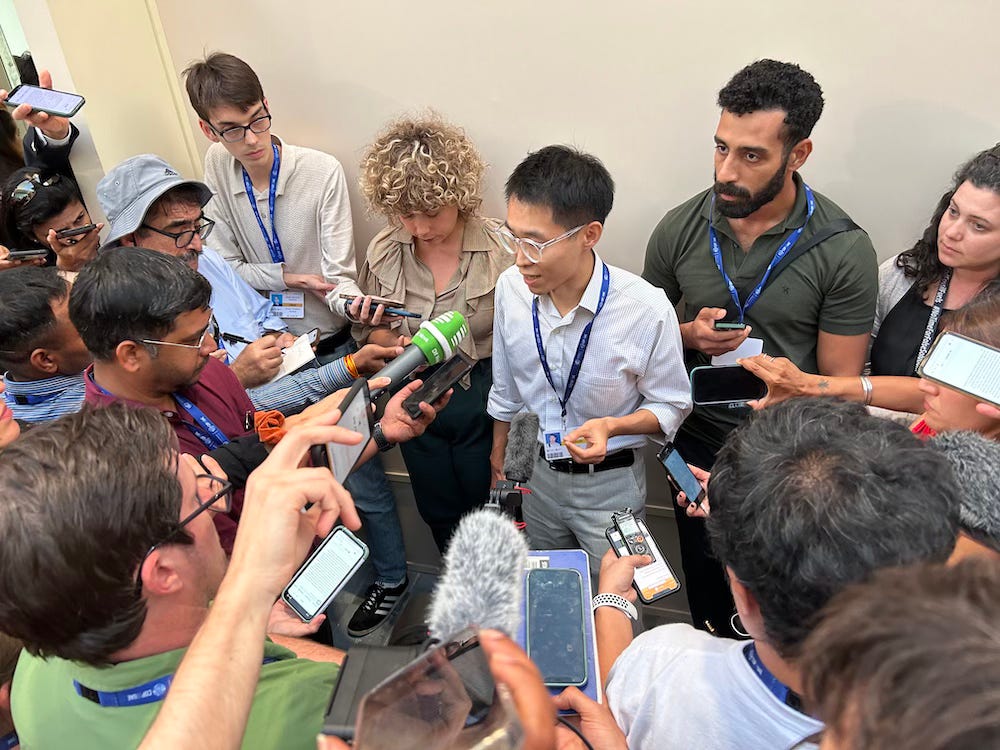
Headed Towards A Failed COP?
Of course, Al Gore already has a statement out. “In order to prevent COP28 from being the most embarrassing and dismal failure in 28 years of international climate negotiations, the final text must include clear language on phasing out fossil fuels,” he writes.
He wasn’t alone. Climate advocates lined up to tell reporters that the text was “a disappointment”, “dog’s dinner”, “disastrous”, “this text has already failed”.
“We are not seeing any mention of phase out or phase down something that we expected,” Shady Khalil of Greenpeace told reporters at an end of the day presser.
It seems a real contradiction from the ambition that started the meeting, when COP28 President Sultan Al Jaber said (and he repeated today) that, “1.5 is my North Star.”
So, where are we?
Pledges made at COP28 so far will only get us 30% of the way to 1.5°C, according to an International Energy Agency analysis released this week. To get the rest of the way, the world needs to reduce fossil fuel use by 48% by 2030. A staggering amount that seems almost impossible to imagine.
We know that any agreement that required specific action would have to be ratified by the U.S. Congress. And yesterday, Alaskan Republican Senator Lisa Murkowski conveyed the sense of the Senate when told reporters in Dubai, “To move to a phase out does not recognize the reality we’re facing.”
So, what could really be accomplished here in Dubai?
But let’s Republican naysaying aside and consider the energy transition we need to accomplish by 2030. Right now, Renewable projects provide an average 9% return in developing countries. How do we entice the trillions of US dollars needed to make that a reality? In seven years?
Assuming a fossil fuel phase out was enacted, what would happen to the countries that depend on oil to provide political stability? Considering that I’m sitting in a glamorous conference center built with oil wealth, this concern has been left entirely unaddressed at COP28.
Meanwhile, we’ll need lots more minerals for EV batteries. How quickly can that be ramped up?
And then there’s the social opposition the world needs to overcome. Remember France’s Gilet Jaune and the guys in Kentucky that “roll coal”? How do we get them on board? Not to mention the U.S. Speaker of the House, who openly denies climate science.
As much ambition climate activists have for the world, I don’t hear much talk about how these big things could be operationalized, how social attitudes and wrenching economic changes could be addressed.
Inevitably, at every COP the ambition of the activists and the needs of developing countries getting squeezed by climate change runs up against political limitations built into the world’s largest and most powerful economies.
That’s where we are tonight. I truly feel terrible for the minister from Tuvalu. He and his people have a terrible future ahead. It’s the price paid for big power politics.
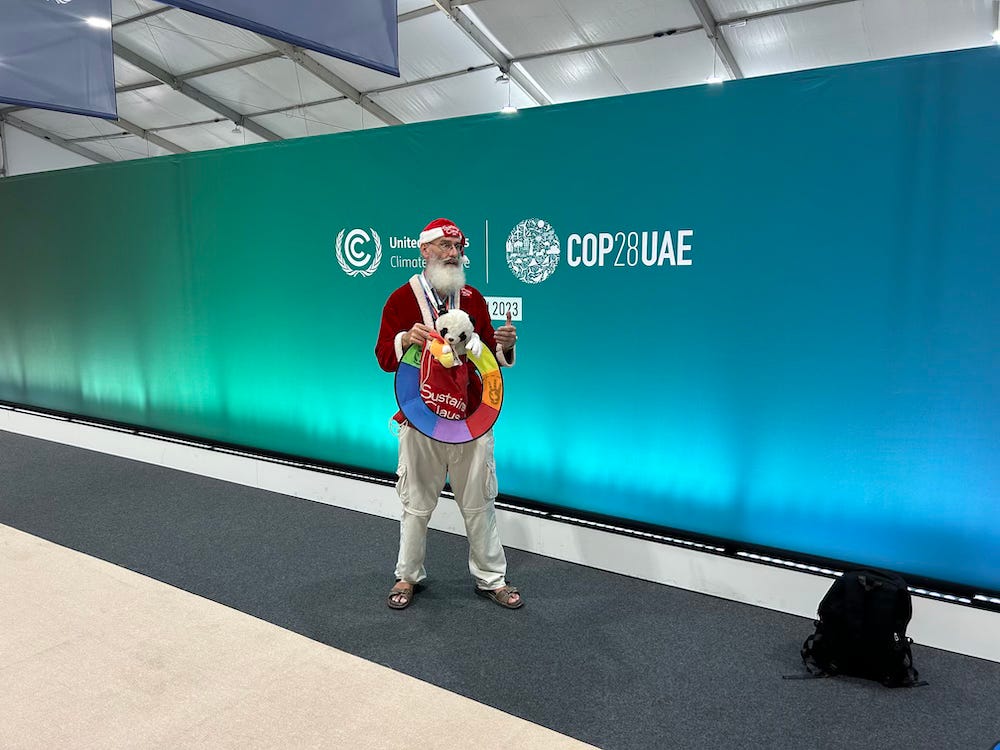
What I Did Today
I arrived early this morning, expecting a press conference on the new Stocktake text. But the text didn’t arrive, and neither did my early morning presser. So, I spent the day ping-ponging from one press conference to another, most of which became irrelevant as news progressed. At one point, I was leaving a briefing room to discover another presser was in the same spot, so I just turned around and went back in. Maybe they would say something interesting? Another reporter remarked to me, “What else do bored reporters have to do?”
At one point, in between pressers, I encountered a trio of Azeri journalists. Where do they think the COP29 meeting would be held in Baku? Is the city big enough to handle 100,000 visitors at once? None of them could figure out a conference center that could hold the meeting. The conversation did not give me confidence that Baku will go well next year.


